The Samsung Galaxy Note7 (S820) Review
by Joshua Ho on August 16, 2016 9:00 AM ESTSystem Performance
As previously mentioned this year a major goal of ours was to focus on benchmarks with metrics that better indicate user experience rather than being subject to additional layers of indirection in addition to updating our previously used benchmarks. Probably one of the hardest problems to tackle from a testing perspective is capturing what it means to have a smooth and fast phone, and with the right benchmarks you can actually start to test for these things in a meaningful way instead of just relying on a reviewer’s word. In addition to new benchmarks, we’ve attempted to update existing types of benchmarks with tests that are more realistic and more useful rather than simple microbenchmarks that can be easily optimized against without any meaningful user experience improvements. With that said, let's get into the results.
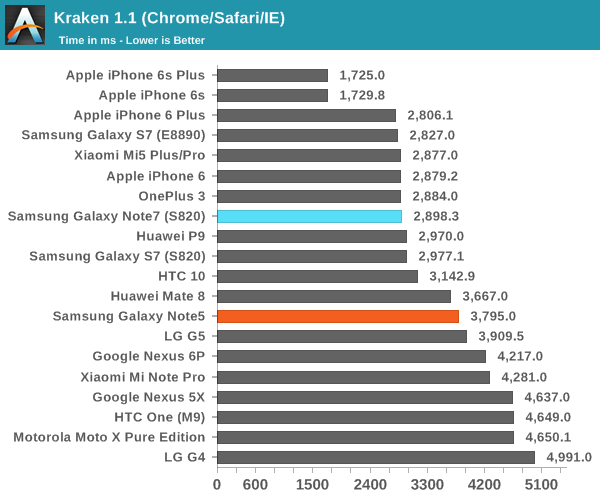
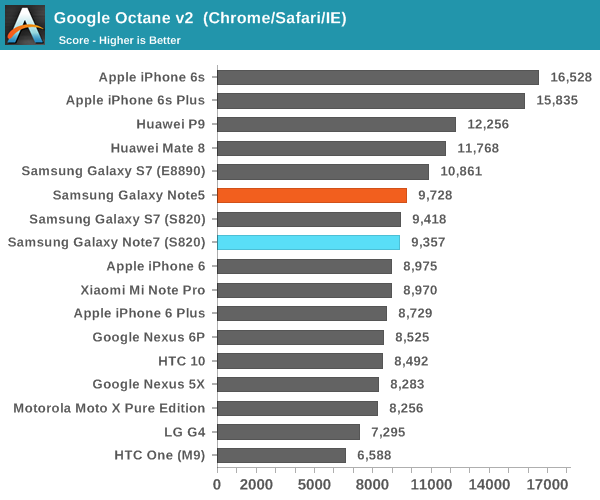
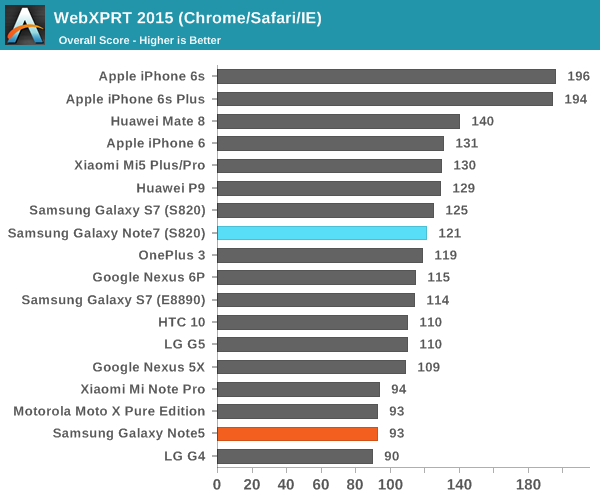
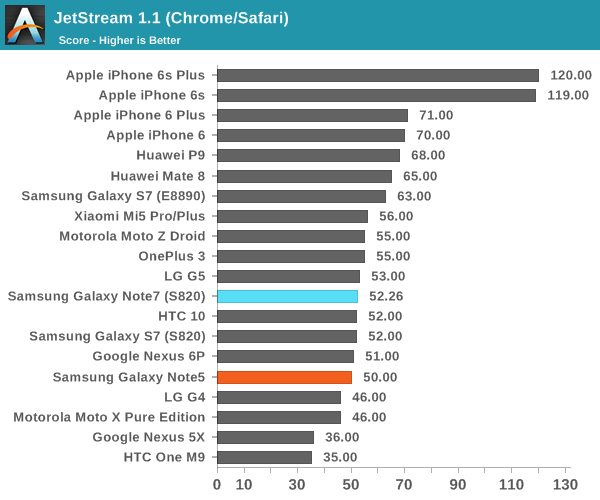
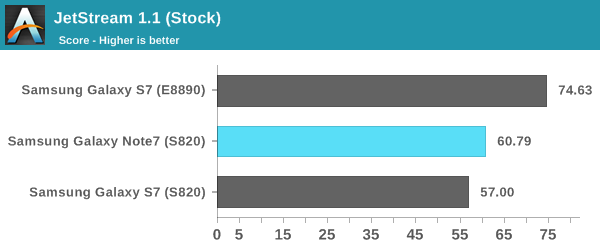
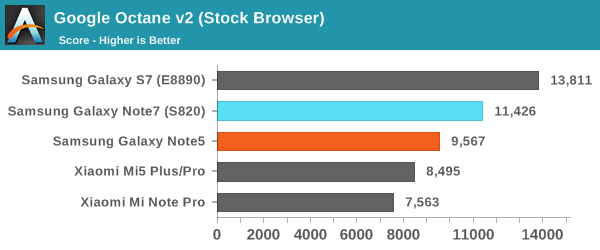
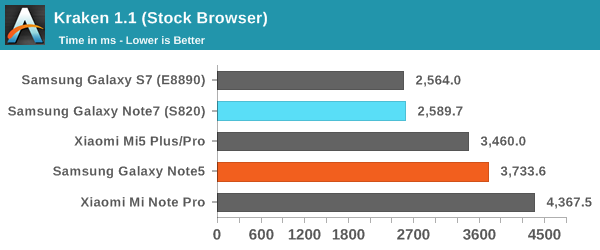
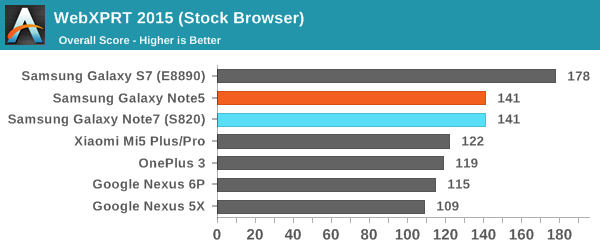
Browser performance here is pretty much in line with expectations as pretty much every OEM using Snapdragon 820 is going to be using the same basic BSP and most of the optimizations here are going to be done by Qualcomm rather than the OEMs.
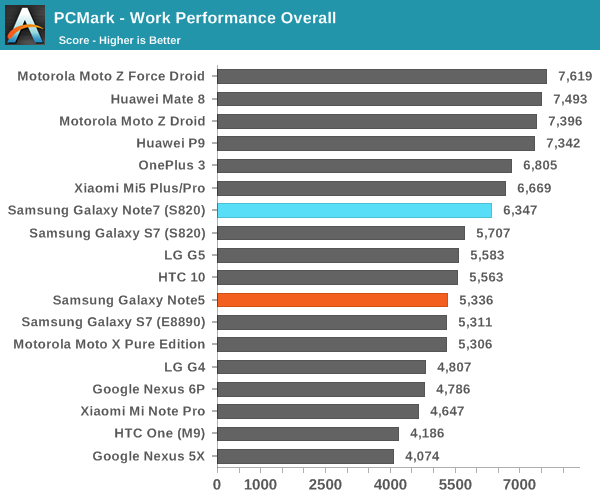
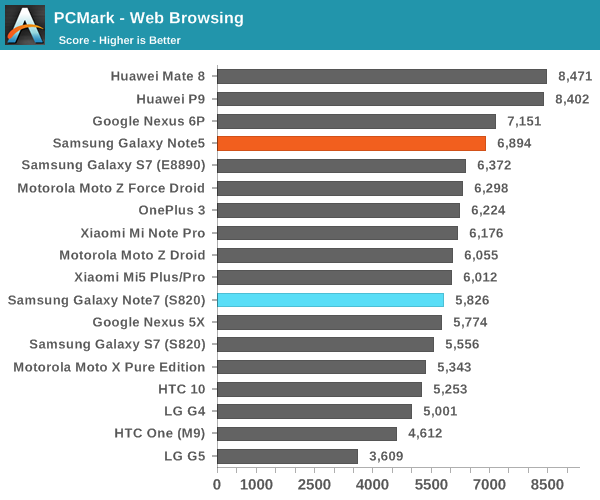
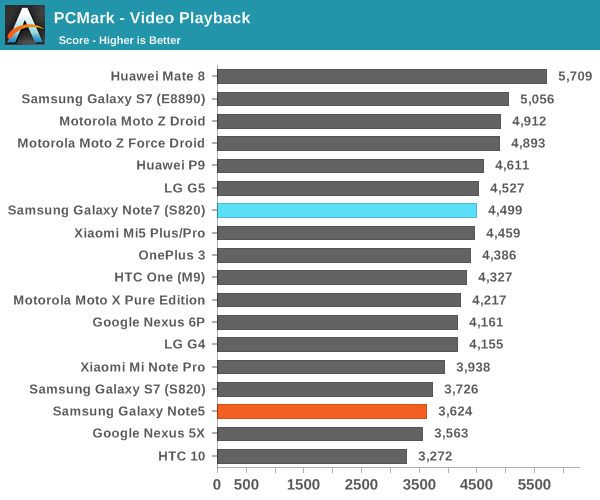
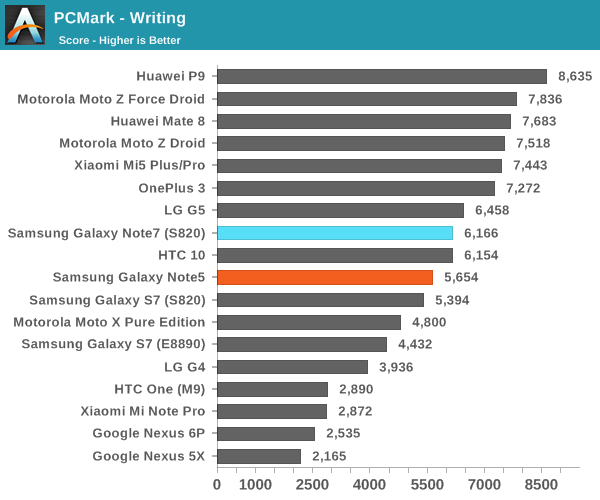
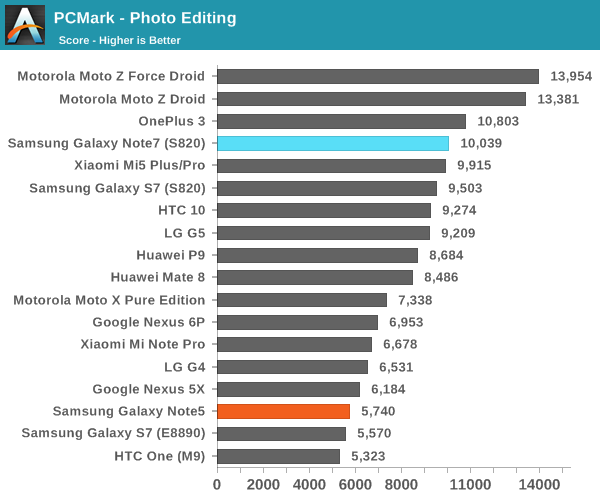
Again, performance is in line with expectation in PCMark, although there are some improvements here and there that are primarily centered about web browsing performance which is almost constantly being improved as developers figure out new optimizations for browsers. With that said we can move on to Discomark, which is a true high level benchmark designed to show exactly how quickly a suite of common Google and OEM applications load from NAND or from RAM.
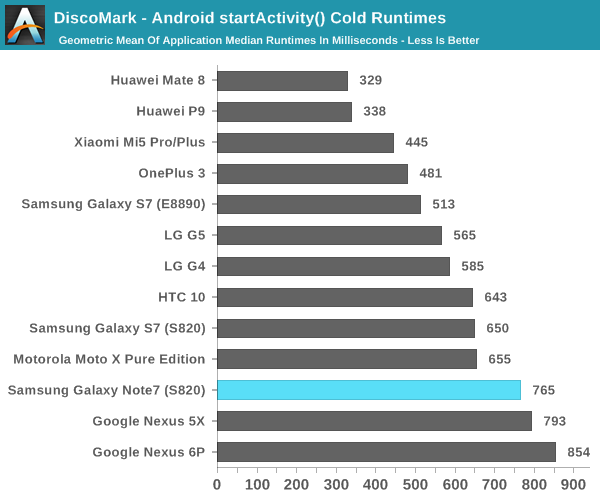
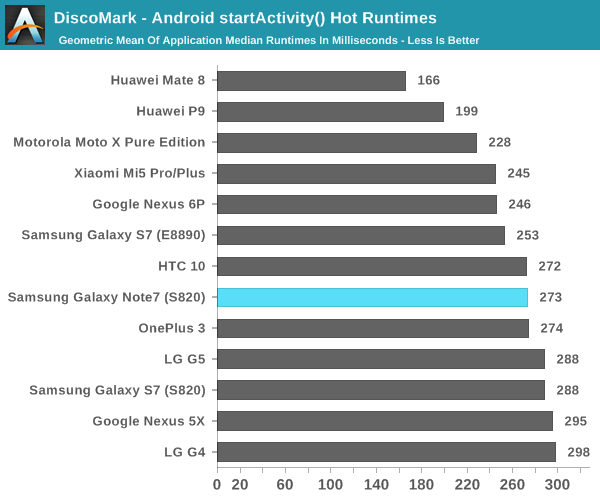
Here the Galaxy Note7 shows some improvement on hot runtimes relative to the Galaxy S7, but the cold runtimes have dropped for some reason. It looks like much of the delta here is due to Dropbox which is now running significantly slower on the Galaxy Note7. I suspect that this is related to possible changes in Dropbox or its interaction with TouchWiz rather than any significant underlying difference in system performance relative to the Galaxy S7. Overall, the Galaxy Note7 performs about where you'd expect from a Snapdragon 820 device from Samsung given the performance of the Galaxy S7.


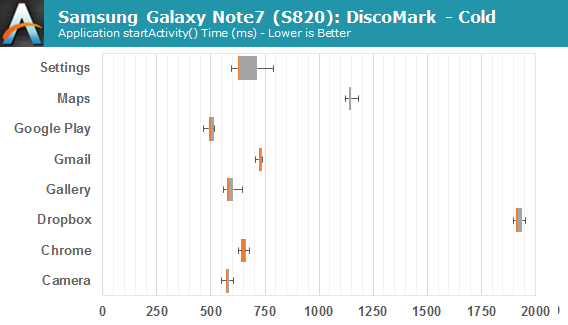
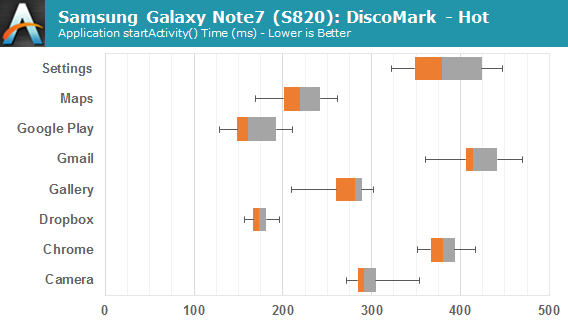








202 Comments
View All Comments
KoolAidMan1 - Tuesday, August 16, 2016 - link
Apple is also responsible for Android's abysmal security and its impending botnet apocalypse.#illuminati
Bluetooth - Tuesday, August 16, 2016 - link
iPhone is twice as fast with the Google Octane benchmark which is the closest to real world usage. I didn't know that Google was optimising their benchmark to make iOS phones leave Android in the dust.trparky - Wednesday, August 17, 2016 - link
Yeah, I was looking at some of the benchmark numbers and the first thing that came to my mind was "Apple is killing them here, they're just killing them!"This is supposed to be the latest and greatest CPU/GPU combination and yet Apple's year old CPU/GPU combination is wiping the floor with Samsung's new phone. Not only is Apple killing them in the browser benchmarks but also in Basemark tests as well. If I was a Samsung fan boy I would be asking why the hell a year old device (iPhone 6s) is seemingly faster than my latest and greatest flagship device.
Now, a number of users are saying that may be because of the CPU governor that Samsung chose to use as the default CPU governor so as to improve overall battery life but as we can see in some of the benchmarks, Apple is killing them yet the iPhone doesn't at all have issues with battery life. So again, why is Apple killing them with a year old device?
God, if the benchmarks look this ugly when compared to the year old iPhone 6s I can't imagine how bad it's going to be when compared to the new chip Apple is going to have in the new iPhone 7 (or whatever it's going to be called). If I had to hazard a guess, it's going to be an absolute bloodbath.
jospoortvliet - Thursday, August 18, 2016 - link
Everyone should know by now that in single threaded use apple is miles ahead of any android vendors, period. Same with storage performance. Multicore performance, which thankfully is a little more important on Android than on iOS, is better with exynos and friends but that is only a little consolation.Psyside - Sunday, August 21, 2016 - link
That is pure BS, i got the 8890 S7 and its utterly fantastic and uber fast.jlabelle2 - Monday, August 22, 2016 - link
Still, it is a little bit sad that, as an iPhone user myself (corporate phone as I am using a Windows phone as a private own), it is now the only thing Apple fans can really brag about. Especially considering that it does not offer any appreciable benefit as most modern flagships are anyway in all practical purpose quick enough for what we are using them.Apple can continue to push this CPU race, we just reached a point of diminish return and this is really not what mobile phone needs now.
People needs smaller phone for a given screen size (iPhone has huge bezel and the Note 7 is a marvel on this regard), they need more battery life and/or better or quicker way to charge (quick charging, wireless charging), they need screen readable outdoor with good contrast (iPhone is good outdoor but contrast is not up to OLED level), they need to be able to perform tasks quicker (camera hardware button, back button, NFC, ...), they need to be able to use their phone with one hand (not having the back link or all the buttons on top like on iOS), they need to be able to take the best pictures possible because this is the camera they are wearing (Apple is still really pushing the envelope with refusing to put a decent camera size sensor in their phone for whatever sake of thinness)...
Let's be frank, I do not know one single person with a big of brain and common sense that would choose an iPhone versus another Snapdragon 820 or Exynote xxx just for the sake of difference of single thread CPU speed. That is just NOT an argument that register in any meaningful way these days to normal people.
grayson_carr - Tuesday, August 16, 2016 - link
How would that help? Even the Exynos S7 doesn't run as smooth as the Moto Z, which is pushing just as many pixels and has s Snapdragon 820. There are two issues, neither of which is the fault of the SD820. First, Samsung phones are bloated with a ridiculous number of features and background services running, which requires more processing power than something running a cleaner build of Android like the Moto Z or a Nexus. Second, because of the extra overhead caused by their software, Samsung has to limit the performance of their chips (both Exynos and Snapdragon) via kernel / governor configuration in order to get good battery life. Samsung could easily tweak the SD820 so that the Note 7 ran perfectly smooth and hardly ever dropped frames. The SD820 is easily capable of that. But if they did that, then the Note 7 would get below average battery life. It's all about priorities. Samsung is betting that their users will prefer good battery life and some minor stuttering here and there over below average battery life and a perfectly smooth UI. I mean, yes, the Exynos is more efficient than the SD820 so they didn't have to limit its performance quite as much to achieve good battery life, but even the Exynos is performing far below it's potential because of Samsung's heavy software and desire for good battery life. The fact that the Moto Z runs smoother than even the Exynos S7 is proof.mrochester - Wednesday, August 17, 2016 - link
Why can't we have both like the iPhone? Too many compromises.Psyside - Sunday, August 21, 2016 - link
NVMe storage, the A9 is far bellow 8890, the storage is the key.trparky - Wednesday, August 17, 2016 - link
But that doesn't explain why the iPhone 6s appears to be wiping the floor with this device and yet iPhone 6s users often enjoy some of the best battery life numbers in the industry.Again, as I said above... If I was a Samsung fan boy I would be asking why the hell a year old device (iPhone 6s) is seemingly faster than my latest and greatest flagship device.